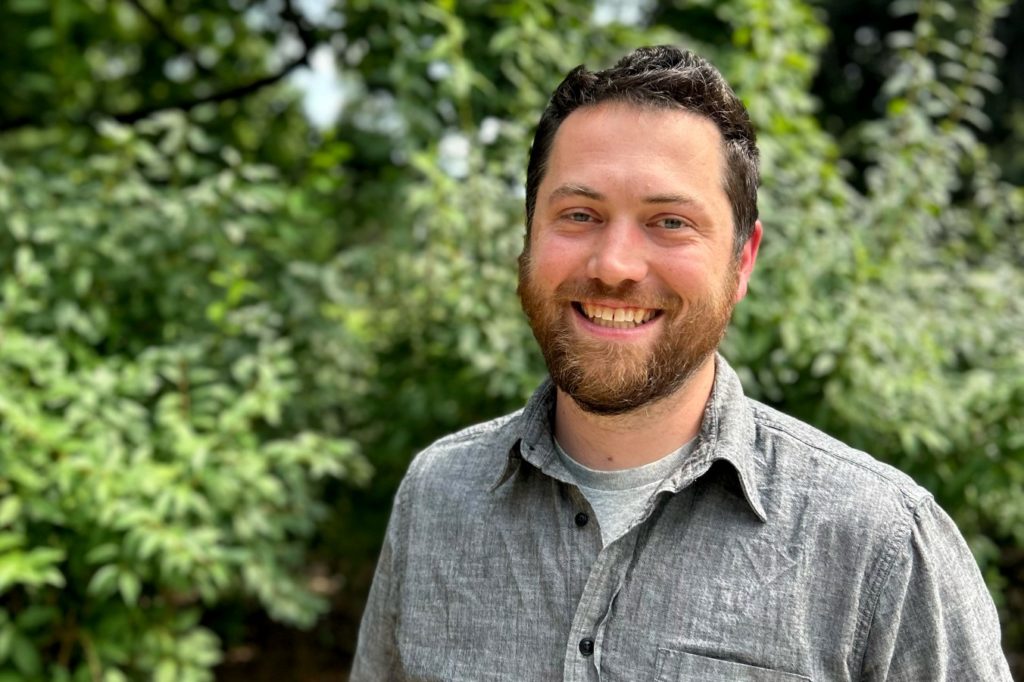Garth Sabo, Assistant Professor of Integrative Studies in the Arts and Humanities (IAH), was appointed Director of the Center for Integrative Studies in the Arts and Humanities (CISAH), effective July 1, 2024.
The mission of CISAH is to empower students to more deeply reflect on, understand, inquire about, and transform the world around them, and to invite all students into lifelong engagement with the arts and humanities.

“The arts and humanities play a vital role in the lives our students will live,” Sabo said, “and as Director of the Center for Integrative Studies in the Arts and Humanities, I am grateful for this opportunity to support our students and faculty as we realize this vision.”
Sabo received his Ph.D. in English from Michigan State University and his M.A. in English from Kent State University. He has taught literature, writing, and humanities courses at Kent State University, Jackson College, and Michigan State University. He currently teaches courses throughout MSU’s IAH curriculum on topics including extinction studies, climate fiction, graffiti, infrastructure, the medical humanities, and the art and literature of the American Midwest.
In addition to his classroom teaching, Sabo has been a member of CISAH’s instructor development team since 2020 and mentors graduate teaching assistants through CISAH’s Innovative Online Pedagogy and Curriculum program. He has previously been recognized for these activities with the Fintz Award for Teaching in the Arts and Humanities, the IAH Award for Excellence in the Mentorship of Graduate Assistants, and Service to IAH Award.
“The arts and humanities play a vital role in the lives our students will live, and as Director of the Center for Integrative Studies in the Arts and Humanities, I am grateful for this opportunity to support our students and faculty as we realize this vision.”
Sabo’s research focuses on literary and cultural depictions of waste, trash, and the human microbiome. His publications include essays published in Arizona Quarterly, Midwestern Miscellany, and CR: The New Centennial Review and book chapters on the global waste crisis and the new urban gothic, entanglements of trash and tackiness, and the literature of Y2K to various edited collections. He is currently working on a monograph on ecocritical approaches to scatological literature titled Bowels of the Earth: Excrement in the Anthropocene and is also engaged in several projects focusing on arts and sciences entanglements, including place-based performance using theatre as a conservation tool at Corey Marsh Ecological Research Center in Bath.
“I have been a member of the IAH community for more than a decade, and time and again over that decade I have been fortunate to see the innovative approaches that make IAH classes a distinctive part of the MSU experience,” Sabo said. “I’m looking forward to the work we’ll do with the departments, instructors, and students who comprise our IAH community to make sure our work together continues to be vibrant, valued, and visible as a key part of fulfilling this university’s land-grant mission.”
IAH courses focus on teaching students to reflect with intellectual curiosity on their own lives, knowledge, values, needs, and desires, experiences, and/or professional or other communities, understand and engage with diverse cultures, communities, identities, experiences, interpretive frameworks, and histories, explore challenging questions about culture, artistic expression, systems of power, the nature of information and knowledge, or other topics that are essential to understanding what it means to be a human being and a global citizen in the 21st century, and interact with the wider world in creative, critical, and socially responsible ways.


